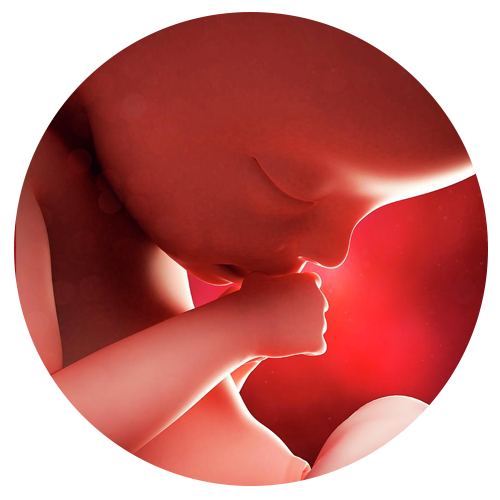Your bump at 21 weeks pregnant.
Your womb can often be felt around the level of the tummy button at 20-21 weeks of pregnancy – so it may have become more noticeable to other people by now. Often women might choose this time to tell their employers about their pregnancy, especially once they have had the anatomy scan (or also known as the 20 week scan anatomy scan). Because the bump is now well out of the pelvis, you might need to start buying new clothes that allow for the change in size of your abdomen, even though you may still look unchanged from behind.
You might notice more gas or heartburn. It’s important to keep a mental note of which foods trigger these symptoms, and try to avoid them. If you get heartburn, avoid particularly spicy or fatty foods, and try not to eat after early evening if you can. A glass of milk at bedtime might help, or simple antacids. Occasionally we your HCP might need to prescribe you medication when simple measures don’t work.
You might also notice stretch marks developing or more swelling of your feet from now on – there is little you can do about the stretch marks but regular exercise, for example, a brisk walk daily and elevating your feet on a stool when sitting can help with the swelling.
Baby size at 21 weeks pregnant
Your baby really starts to grow now – he or she measures about 27cm (or 10.5 inches) and already weighs about 340-400g. You might sometimes read that this is about the size of a large banana.
Ultrasounds & scans at 21 weeks pregnant
You will be invited for an ultrasound scan between 20 and 21 weeks of pregnancy. This scan is an important part of checking for any physical abnormalities in your developing baby’s anatomy, and is therefore called a fetal anomaly scan. You will also if you choose to, be bale to find out if you are expecting a baby boy or girl. Already a female fetus will have her store of eggs (around 6 million) and a baby boy’s testicles will have developed – although they will still be in his tummy at this stage and not the scrotum. This scan is very detailed as the sonographer needs to carefully check all the anatomy in detail, so you should allow 30-60 minutes for the scan. This is because it takes 30 minutes on average, but don’t be alarmed if it takes longer – sometimes the baby’s position doesn’t allow a clear view and you might be sent on a walk or asked to lie in different positions to facilitate a better look. At this scan you can see if the placenta is lying low in the womb – if that is the case don’t worry as this normally changes by 34 weeks in most pregnancies, but you will need more scans and will be advised to avoid intercourse to reduce the risk of bleeding.
In the very rare cases where an abnormality is found on the anomaly scan, you will be sent to a specialist unit for further tests and advice. This can be a worrying time, but remember that congenital abnormalities are uncommon.
Weight gain at 21 weeks pregnant
I always advise my clients that it is advisable that there is no need to ‘eat for two’ at any stage of pregnancy. In fact you don’t really need extra calories until the third trimester (and even then only 200 kcal extra per day). Depending on your weight and BMI at your visit you will have been advised on what is a healthy weight gain in pregnancy. For most women this is between 10-12 kg through the entire pregnancy. So, by week 21 you might have gained 4-5kg on average. However if you started pregnancy either underweight or overweight, you will need individualized advice from your healthcare professionals.
Can my baby hear me at 21 weeks pregnant?
It may seem incredible, but you baby can now hear you at 21 weeks! So, it’s a good time to start talking to your baby and even singing a song or two. Remember your baby will think you have the best voice in the world – so don’t feel shy – it’s a great way of bonding with your baby. He or she is also starting to develop fine downy hair called lanugo, and eyebrows and is swallowing the water in the sac called amniotic fluid.
I’m 21 weeks pregnant and haven’t felt my baby move yet
It’s not unusual to not have felt definite movements of your baby by 21 weeks, especially if this is your first pregnancy or if the placenta has implanted anteriorly (at the front of the womb). If you work or have other children to look after, you might just be too busy in the day to notice movements. It’s common to feel them first at night when you are in bed – initially they may feel like trapped wind or infrequent flutters or ‘pops’, but they become more distinctive overt he next 2-4 weeks. It’s common to feel the movements earlier in subsequent pregnancies – your abdominal muscles are more lax and you also know what they feel like.
What should I be doing at 21 weeks pregnant?
This is a good time to think about antenatal classes and book them in. If you want to try Hypnobirthing, you need to book your classes as the best time to start is 23-24 weeks. You also need to plan when you are going to have the Whooping Cough vaccination recommended for all pregnant women to protect their babies after they are born. It’s really important to have a check-up at your dentist too – dentists recommend that you get your regular examinations and dental cleaning throughout your pregnancy as needed. The hormonal changes of pregnancy can cause your gums to swell and become irritated more easily. These preventative appointments are important to keep potential gum disease and infections at bay as they have been shown to be associated with a higher risk of preterm birth.
You will probably need to get your MatB1 form from your midwife or GP if you are employed in order to claim your maternity pay – now is a good time to submit it to your employer.
Regular exercise and a healthy diet are so important during pregnancy, and as your third trimester approaches they help to keep you feeling more fit and active, with less swelling and bloating. If your bowels become an issue, it might be a good idea to consider taking probiotic capsules. These might also help your immune system.
You should also have a discussion with your midwife or doctor about the Covid vaccination, as the risk of Covid making you ill or affecting your birth and baby is higher in the third trimester. This decision aid might help to clarify how you feel.
Next steps
Try these Omega 3 rich snacks and small meals:
- Mackerel on a slice of wholegrain toast
- Grilled salmon with steamed vegetables
- Salmon fishcakes
- A handful of nuts and seeds
- A bowl of wholegrain cereal


